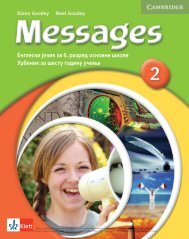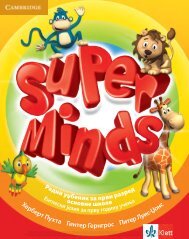Енглески језик 8, уџбеник, старо издање, Нови Логос
- No tags were found...
You also want an ePaper? Increase the reach of your titles
YUMPU automatically turns print PDFs into web optimized ePapers that Google loves.
VOCABULARY AND LISTENING Reporting verbs<br />
I can understand a radio programme about famous conmen.<br />
I can talk about<br />
important dates<br />
1 Check the meaning of the verbs in the box.<br />
Then choose the correct words in the text.<br />
invite order refuse explain convince<br />
offer agree complain admit insist<br />
STUDY STRATEGY Learning verb patterns<br />
2 Study the verb patterns in the table. Add<br />
five more verbs from the text in exercise 1<br />
to the table.<br />
<br />
order ask tell invite<br />
1<br />
someone to do<br />
something<br />
<br />
refuse 2 3 to do something<br />
that<br />
complain admit<br />
4 5 that …<br />
3 3.22 Rewrite sentences 1–6. Then listen<br />
and check your answers.<br />
For Sale:<br />
The Eiffel Tower<br />
Tuesday 19.30 Channel 6<br />
In 1925, a conman called Victor Lustig<br />
1<br />
invited / refused businessmen to<br />
attend a meeting, where he 2 admitted /<br />
offered to sell the Eiffel Tower to<br />
them. Lustig didn’t own the tower, but<br />
he 3 complained / explained that he<br />
represented the city of Paris. It was a<br />
lie. He told the businessmen that the<br />
city council didn’t want the tower, but<br />
4<br />
refused / insisted that it was a secret<br />
because the people of Paris would<br />
5<br />
complain / order if they knew about the<br />
plans. In the end, a man called Poisson<br />
6<br />
agreed / admitted to buy the tower.<br />
This week’s programme tells the story<br />
of Victor Lustig and other conmen who<br />
have 7 convinced / agreed people to<br />
buy some of the world’s most famous<br />
buildings.<br />
‘Yes, I lied.’ (He admitted …)<br />
He admitted that he’d lied.<br />
1 ‘Go to your room, Sandra!’ (He ordered …)<br />
2 ‘No, I won’t go!’ (He refused …)<br />
3 ‘Shall I open the window?’ (She offered …)<br />
4 ‘Will you all come to my party?’ (He invited …)<br />
5 ‘We haven’t got any money.’ (They<br />
complained …)<br />
6 ‘I didn’t do it!’ (He insisted …)<br />
4 3.23 Listen to the radio programme. Who<br />
was George C. Parker? What happened to him?<br />
5 3.23 Listen again and write true or false.<br />
Correct the false sentences.<br />
1 Poisson’s wife had some doubts about the<br />
deal.<br />
2 Poisson didn’t complain to the police<br />
because he was happy with the deal.<br />
3 George C. Parker told visitors to New York<br />
that he owned buildings in the city.<br />
4 Parker had authentic documents for the<br />
buildings.<br />
5 Parker sold the Brooklyn Bridge twice.<br />
6 The other prisoners didn’t respect Parker.<br />
6 ACTIVATE Work in pairs. Invent a new crime<br />
story using verbs in exercise 1. Then present<br />
your stories to the rest of the class.<br />
82 Honestly!<br />
Property of Oxford University Press. Provided for and restricted to creating accessible formats for users with a disability.

















